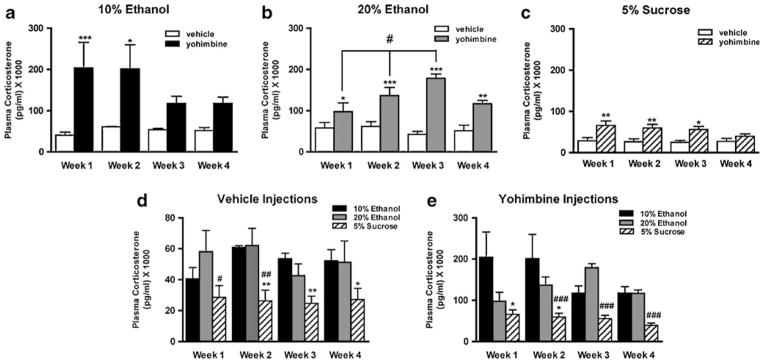Fig. 3.

Yohimbine administration induces elevation of CORT in ethanol- and sucrose-trained animals. CORT levels following both vehicle and yohimbine administration are significantly higher in ethanol-seeking animals than in sucrose-seeking animals. Yohimbine (2 mg/kg i.p.) or vehicle (distilled water) were administered once weekly for four consecutive weeks and induced a significant increase in CORT in a 10% ethanol-trained animals for the first 2 weeks (***p< 0.001; *p<0.05 compared to vehicle), in b 20% ethanol-trained animals for all 4 weeks (***p<0.001; **p<0.01; *p<0.05 compared to vehicle: #p<0.05 compared to week 1 yohimbine plasma CORT), and in c sucrose-seeking animals for the first 3 weeks (**p<.01; *p<0.05 compared to vehicle). d Ethanol-trained animals had a significantly higher CORT response to vehicle injection than sucrose controls (**p< 0.01; *p<.05 comparing 10% ethanol CORT to 5% sucrose CORT for the corresponding week: ##p<0.01; #p<.05 comparing 20% ethanol CORT to 5% sucrose CORT for the corresponding week). e Ethanol-trained animals had a significantly higher CORT response to yohimbine injection than sucrose controls (*p<.05 comparing 10% ethanol CORT to 5% sucrose CORT for the corresponding week: ###p<0.001 comparing 20% ethanol CORT to 5% sucrose CORT for the corresponding week). Data are presented as mean±SEM, (n=11 for the 10% ethanol, n=11 for the 20% ethanol group, and n=12 for sucrose group). Statistical analysis was performed by ANOVA with Newman–Keuls post hoc testing
